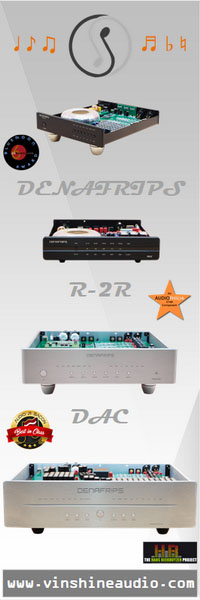AudioPrism’s Ground Control:
|
AudioPrism’s Ground Control:
|
|
On Tuesday evenings, the husband of a couple who summer in a town not far from ours drops by for some listening as his wife attends a life-drawing session. My Tuesday-evening guest holds a PhD in electrical engineering – a no-nonsense, measurements-and-numbers kind of guy. But flexible. His skepticism with respect to audio’s weird-science accouterments was earlier eroded by a simple now-it’s-on, now-it’s-off demonstration of Acoustic Revive’s RR-77, which operates, or so they say, on a principle identified as the Schumann Resonance. I’ve mentioned this product in my Random Noise columns. The important thing is, he likes good sound and listens with an open mind. Before we settled down, I asked him to look at a statement accompanying AudioPrism’s Ground Control. It discusses ground planes in an historical context and segues to the GC’s purpose and accomplishments. My friend didn’t get it. The statement wasn’t convincing, nor, he thought – at least to look at – was the Ground Control itself, consisting in the main of a few of inches of copper wire encased in a tiny sock. I don’t get it either, but I’m a techno-dummy who knows better than to pass along jargon I don’t understand. I listen. Period. So then. I began with Mingus Big Band Live at Jazz Standard, a nicely recorded, agreeably aggressive CD released in 2010 (www.mingusmingusmingus.com andwww.jazzstandard.com).
The interruption continues. There’s weird science, and then there’s weird science. The Ground Control is the work of EnABL’s Bud Purvine, whom AudioPrism’s Byron Collett describes as a brilliant designer of transformers and such. Purvine has accumulated patents, an enthusiastic following, and a presence on the Internet I invite you to investigate. I need to return to these fascinating little whatevers. In the matter of a reliable A/B comparison, it’s a lot simpler to pull and reinstate RCA-terminated Ground Controls than to remove and restore the spade-terminated GCs at the Wilsons’ binding posts. For most of us, the memory for other than gross differences in sound is short and unreliable. To return to our story: the big-band disc and a second demo, a beautifully recorded Haydn string quartet on the TACET label, elicited a comment I’ll not soon forget: “This shouldn’t be happening.” You can imagine the expression that went with this. But it was happening. My friend was in the sweet spot. As before, standing at my system’s electronic components – in other words, behind the speakers and facing the wall – even I could hear it: with the amps’ and CDP’s Ground Controls removed, the system relinquished a clearly audible slice of liveliness and body. Days before, I heard an improvement on my own when I first installed GCs at the speakers’ negative binding posts. There is nothing vague about the benefit to an already excellent system these five Ground Controls deliver. I like my Tuesday visitor’s attitude. His background and assumptions defer, need be, to what he hears. Like Clement Perry (his GC review here), I’m sold on tweaks, but I don’t hold all in equal esteem. A few in my system play a pro-forma role. If I removed the speaker-cable lifters, I doubt I’d hear much of a difference. I figure that they do no harm and perhaps a smidgen of good. And they look sexy. I hesitate to call the Ground Controls sexy. Like the featherweight RR-77 – is there actually anything inside that thing? – what they do for a system’s sound flies in the face of their seeming insignificance. The GCs I’ve been using are identified as Reference. The substantial list prices reflect the cost of their XHADOW silver connectors and the tariff we enthusiasts pay for success.
Reference RCA, $149.95 each. Reference spade, $249.95 / pair. You can check out the entire line, with prices, banana terminations included, atMusicDirect.com. Website: www.audioprism.com
|
Stereo Times Masthead
Publisher/Founder
Clement Perry
Editor
Dave Thomas
Senior Editors
Frank Alles, Mike Girardi, Russell Lichter, Terry London, Moreno Mitchell, Paul Szabady, Bill Wells, Mike Wright, and Stephen Yan,
Current Contributors
David Abramson, Tim Barrall, Dave Allison, Ron Cook, Lewis Dardick, John Hoffman, Dan Secula, Don Shaulis, Greg Simmons, Eric Teh, Greg Voth, Richard Willie, Ed Van Winkle, Rob Dockery, Richard Doron, and Daveed Turek
Site Management Clement Perry
Ad Designer: Martin Perry











Be the first to comment on: AudioPrism’s Ground Control: